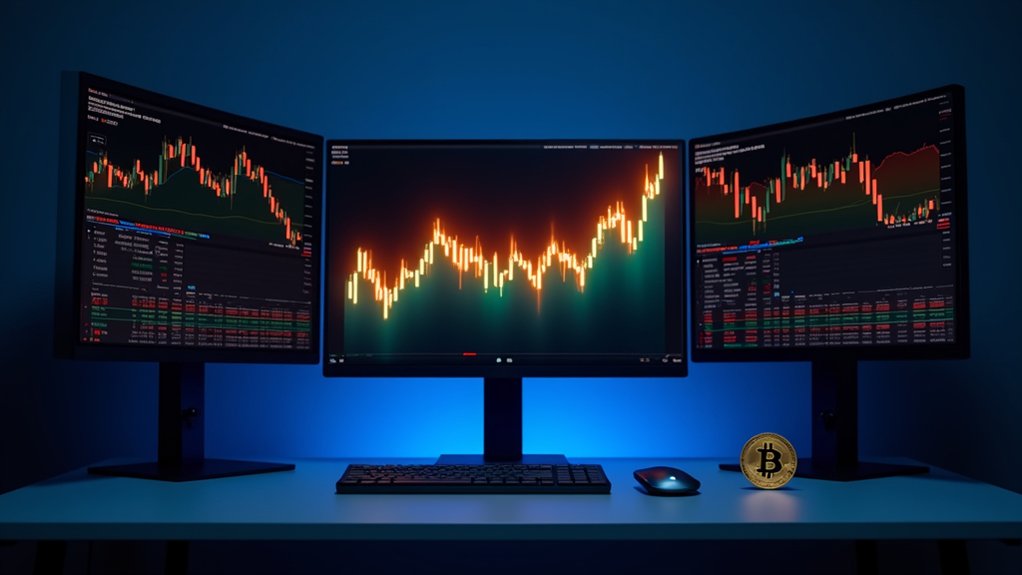Popular cryptocurrency exchanges like Coinbase, Binance, Kraken, Gemini, and Crypto.com offer digital marketplaces where people can buy, sell, and trade digital currencies. These platforms feature user-friendly interfaces, various trading tools, and security measures like two-factor authentication and cold storage for asset protection. Each exchange has different fee structures and supports anywhere from 70 to 600+ cryptocurrencies. Below, we'll explore the unique features and capabilities of these major trading platforms.

Cryptocurrency trading platforms serve as digital marketplaces where people can buy, sell, and exchange digital currencies. These platforms come with different features and fees, making it important for users to comprehend their options. The most popular exchanges include Coinbase, Binance, Kraken, Gemini, and Crypto.com, each offering their own unique advantages.
Coinbase has built a reputation for being user-friendly, offering access to over 240 cryptocurrencies with fees ranging from 0% to 3.99%. Binance, the largest exchange globally, supports more than 600 cryptocurrencies and charges a competitive 0.1% trading fee. Many exchanges offer discounted fees when users hold their native utility tokens. Kraken provides advanced trading features and access to over 300 cryptocurrencies, with fees between 0.16% and 5%. Gemini lists more than 70 cryptocurrencies and includes their ActiveTrader platform, while Crypto.com focuses on mobile trading with over 350 cryptocurrencies available. Many platforms offer staking rewards up to 12% APY for users willing to lock up their assets.
These platforms utilize sophisticated technology to facilitate trading. Their order matching engines pair buyers with sellers efficiently, while spot trading enables immediate cryptocurrency transactions. Some platforms offer margin trading for leveraged positions and futures trading for those who want to agree on predetermined prices. Most exchanges maintain market depth through integration with multiple liquidity providers, ensuring stable trading conditions for users. Unlike traditional brokerages, these exchanges allow users to perform direct withdrawals of their cryptocurrencies to personal wallets.
Security remains a top priority for cryptocurrency exchanges. They implement various measures to protect users' assets, including two-factor authentication for account access and cold storage for keeping most funds offline. These platforms also maintain regulatory compliance with local financial authorities and often carry insurance coverage for digital assets. Regular security audits and penetration testing help guarantee the safety of users' investments.
Traders can access various tools to help them make informed decisions. Real-time price charts and market data provide current information about cryptocurrency prices and trends. Order books show all current buy and sell orders, helping traders understand market demand. Many platforms offer API access for automated trading strategies and mobile apps for trading on the go.
Copy trading has emerged as a popular feature on some platforms, allowing newer traders to automatically replicate the trading strategies of more experienced users. This feature, combined with user-friendly interfaces and educational resources, helps make cryptocurrency trading more accessible to newcomers.
As the cryptocurrency market continues to evolve, these platforms regularly update their features and security measures to meet the changing needs of traders.
Frequently Asked Questions
How Long Does It Take to Verify My Identity on Crypto Exchanges?
Crypto exchange verification usually takes 10-30 minutes for basic checks, but it can stretch to 1-3 business days for advanced verification.
During busy periods, it might take 5-7 business days. The timing depends on factors like how many people are trying to verify at once, what documents are needed, and whether it's automated or manually reviewed.
Some exchanges offer instant verification, while others need extra time for manual checks.
Can I Trade Cryptocurrency Using My Retirement Account or Pension Funds?
It's possible to invest in cryptocurrency through certain retirement accounts. Self-directed IRAs let people directly hold crypto, while some 401(k) plans offer crypto exposure through funds.
There are companies that specialize in crypto IRAs, like BitcoinIRA and Alto CryptoIRA. However, the Department of Labor has warned about crypto in retirement plans, and there are risks involved since crypto isn't protected by FDIC insurance like regular bank accounts.
What Happens to My Crypto if an Exchange Goes Bankrupt?
When a crypto exchange goes bankrupt, customer funds typically get frozen right away.
The bankruptcy court takes control of the process, and customers can't withdraw their crypto.
Since crypto isn't protected like regular bank accounts, customers become unsecured creditors.
They'll need to file claims to try getting their money back.
This process can take months or years, and customers often only get back a portion of their original funds.
Are Crypto Trading Profits Taxed Differently in Different Countries?
Yes, crypto trading profits are taxed quite differently around the world.
Some countries don't tax crypto gains at all, while others charge high rates. For example, Georgia doesn't tax individual crypto profits, but India charges a flat 30% tax.
Germany doesn't tax crypto held for over a year, while the Netherlands taxes crypto even if it hasn't been sold.
Tax rates can range from 0% to 45% depending on the country.
How Can I Recover My Account if I Lose My Two-Factor Authentication?
If someone loses their two-factor authentication (2FA), they've got several ways to get back into their crypto account.
They can contact the exchange's support team with their ID and account details. Many users keep backup codes from when they first set up 2FA – these work as a one-time password.
Some exchanges also offer alternative methods like SMS verification, email recovery, or security questions.
The process usually requires identity verification and patience.





